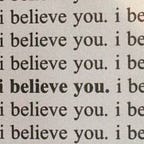Nagging Feelings; Three Years without Justice for Oluwatoyin Salau
This morning I got dressed and unconsciously chose a shirt that said Justice for Oluwatoyin.
I pulled it over my head and paused for a long time remembering her death.
Oluwatoyin was murdered three years ago today, after being kidnapped and raped repeatedly.
That same week she’d been unhoused and assaulted, and also putting her body on the line for her trans siblings. She was vocal about the injustice of the murder of Tony McDade, and vocal about her experiences of violence.
She died still a teenager during Pride of 2020 after being missing for more than a week.
Her death never made national news.
She died during a pandemic moment of illness, mourning, protest and visibility of abolition and mutual aid projects that has given way to criminalization, expansion of the state, and uneven responses from communities to questions of what is worth our imaginations.
Over the last three years I have filled journals with writings and Oluwatoyin’s experiences that led to her death have been present frequently in my most unresolved questions.
In relating to institutions and community spaces as a facilitator or consultant, and to children and caregivers as an educator and doula, I am often asked to create content that simplifies complex ideas. Sexual violence is one of those ideas, and so is racism, or community responses to harm.
I don’t relate to the life or death of Oluwatoyin primarily as one of those roles, I relate to her most naggingly from a place of shared survivorship. From a place of emotion that is hard to soothe, and therefore hard to acknowledge honestly.
I relate to her as someone who illuminates how survival can be a choice between interpersonal safety and material resources.
How anti Blackness is gendered, impossible to separate from what leads to what and why.
How frequently experiences of violence can be both reoccurring and unrelated to one another within even short spans of an individual’s experience and interactions with others.
How much risk is assumed by someone accepting help from a place of need and trust.
How much is specific about vulnerability, even more than how much is able to be mitigated, validated, or even addressed meaningfully in the moment or in new ways of responding.
How much leaving violent homes or relationships or situations has nothing to do with whether safety is present in leaving.
How unpopular it is to ask the in the weeds questions that are necessary to ask if safety is a practical goal that communities create together.
How little ‘together’ held Oluwatoyin.
When I let myself imagine safety, I imagine Oluwatoyin alive. I imagine what would have led to her alive today. I imagine how she would have been known outside of tweeting her own assault or chanting Black Trans Lives Matter.
I imagine her loved, and shown community’s valuing of her body sovereignty, not having to choose between one violence and another.
I imagine that three years of mourning her death transforms how we respond to survivors of sexual violence who are navigating the practical and impractical work of imagining how to be safer to live and heal in their bodies.
